Pipe Tapping
The AWWA National Tapping Competition is a competition of skill in which water operators from across North America work against the clock to open a cement-lined, ductile iron pipe and install a tap.

Congratulations to the 2025 Winners!
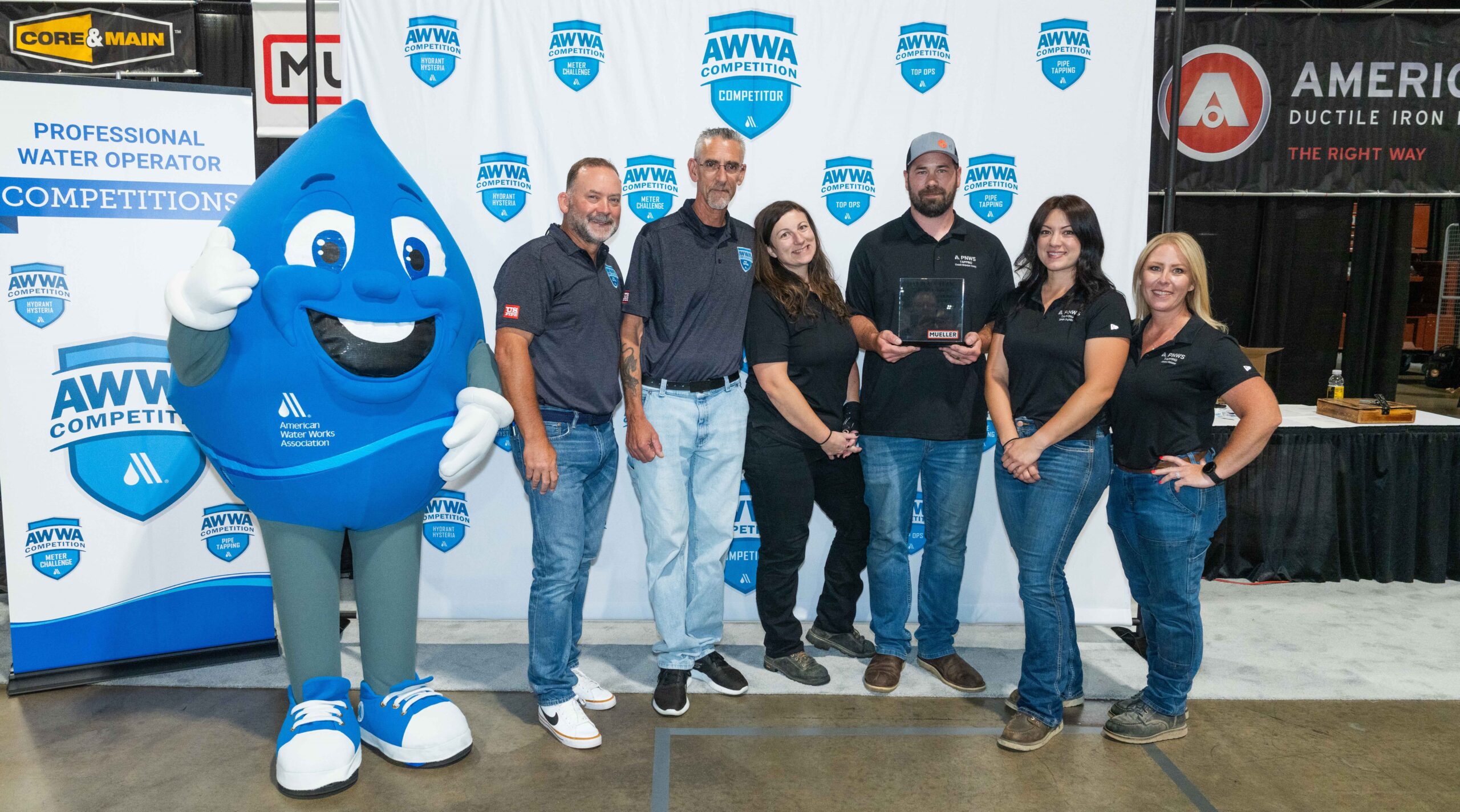
Women’s Pipe Tapping
First Place: Grit City Grind, Tacoma Water, Pacific Northwest Section, 2:29:47 (Returning Champions)
Second Place: Alamo City Tappers, San Antonio Water Systems, Texas Section, 2:57:75
Third Place: Lansing Lethal Ladies, Michigan Section, 3:08:31
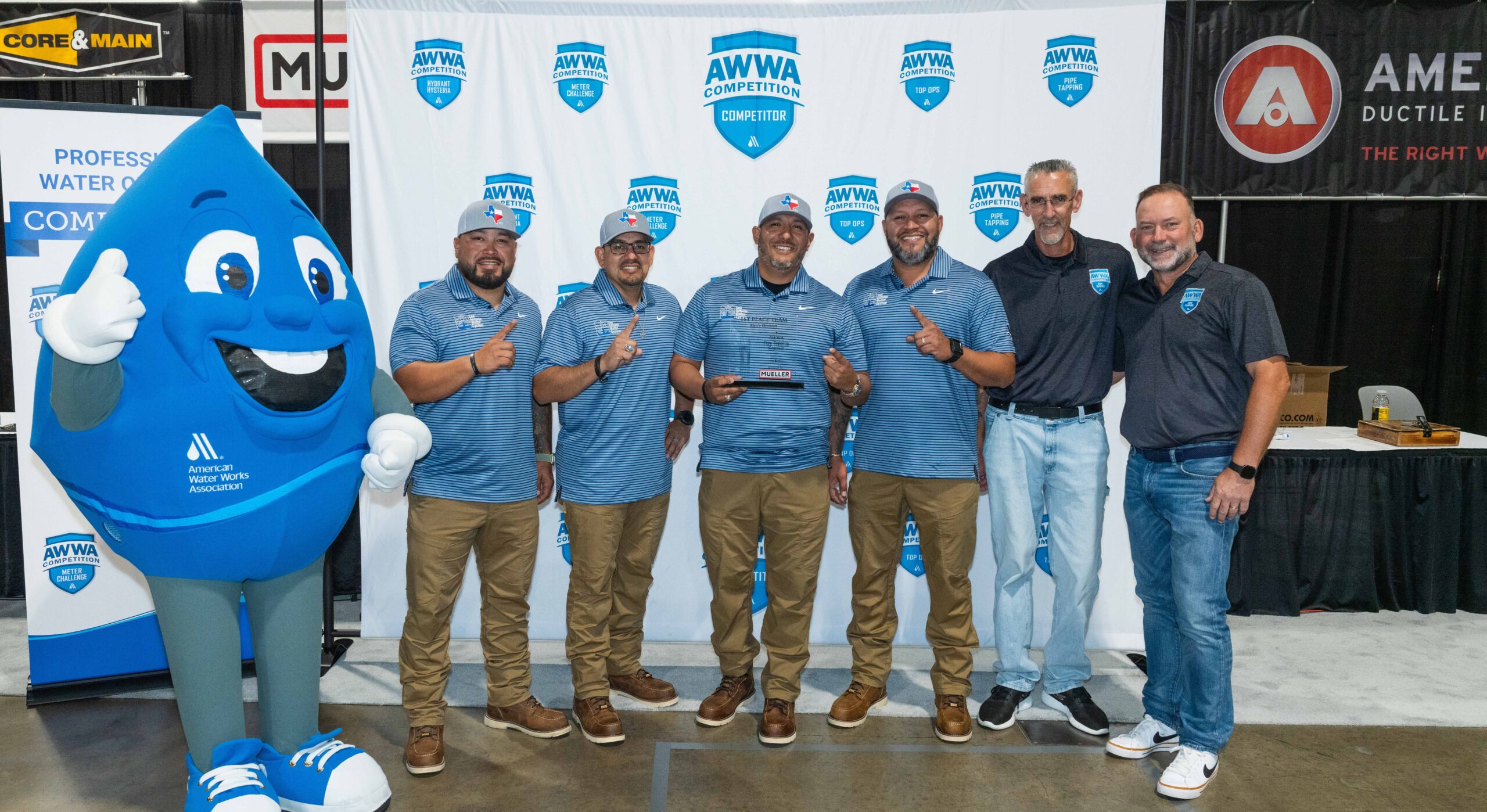
Men’s Pipe Tapping
First Place: Alamo Drillerz, Texas Section, 1:10:87
Second Place: BWWB Blue Team, Alabama-Mississippi Section, 1:16:38
Third Place: SADM Apodaca, Mexico Section, 1:17:31
Fourth Place: Michigan Tappers, Michigan Section, 1:22:82
Fifth Place: Big Blue Tappers, Washington Suburban Sanitary Commission, Chesapeake Section, 1:32:21
View Full Final Results
Pipe Tapping Highlights
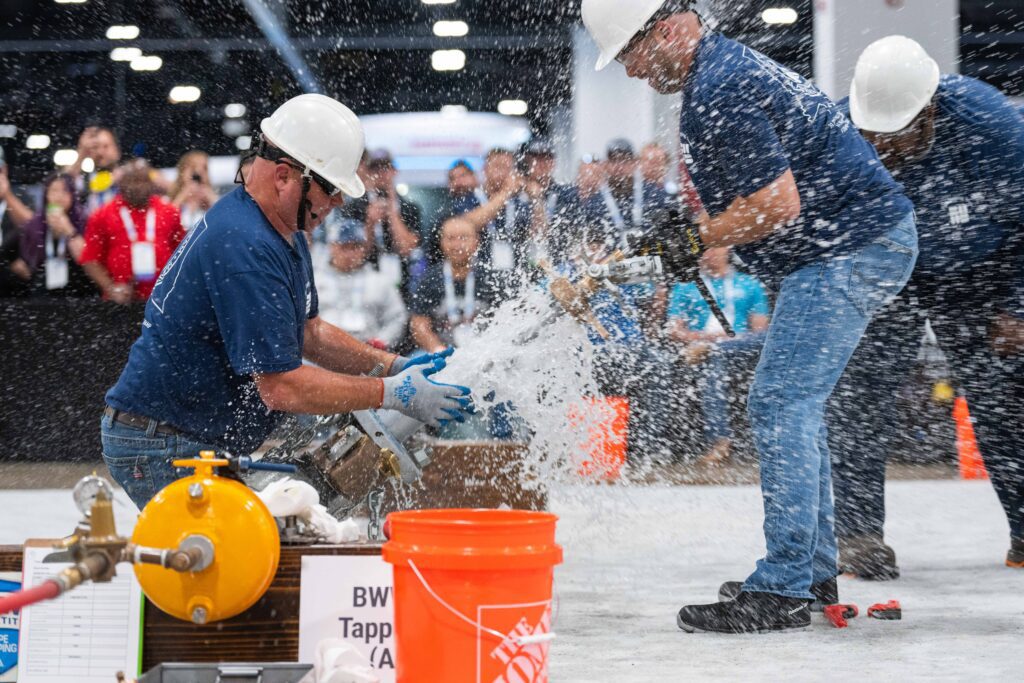
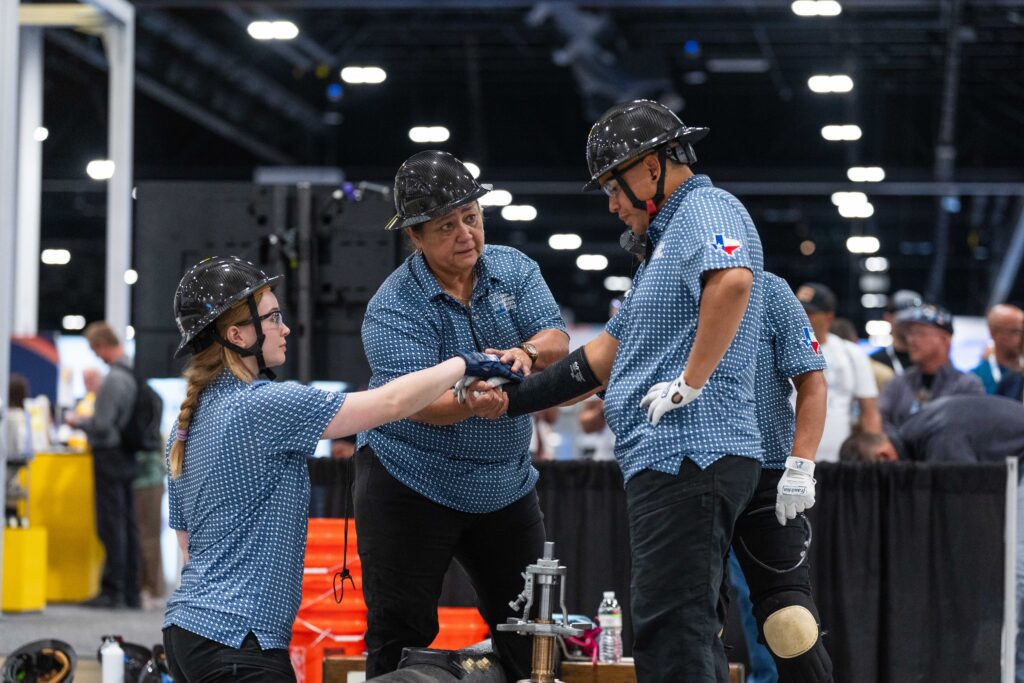
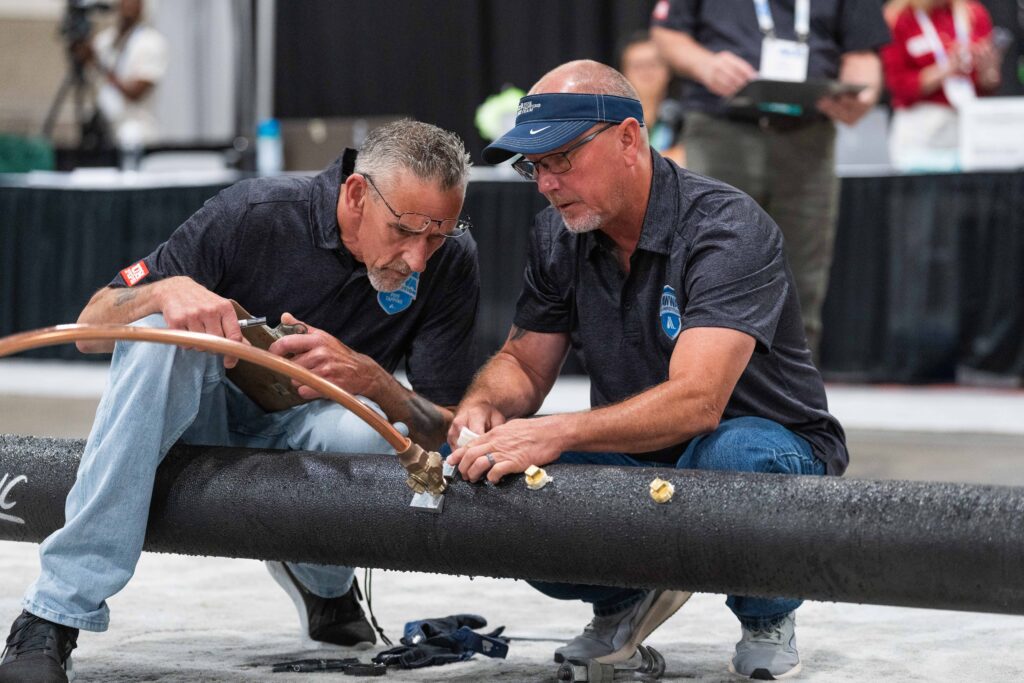
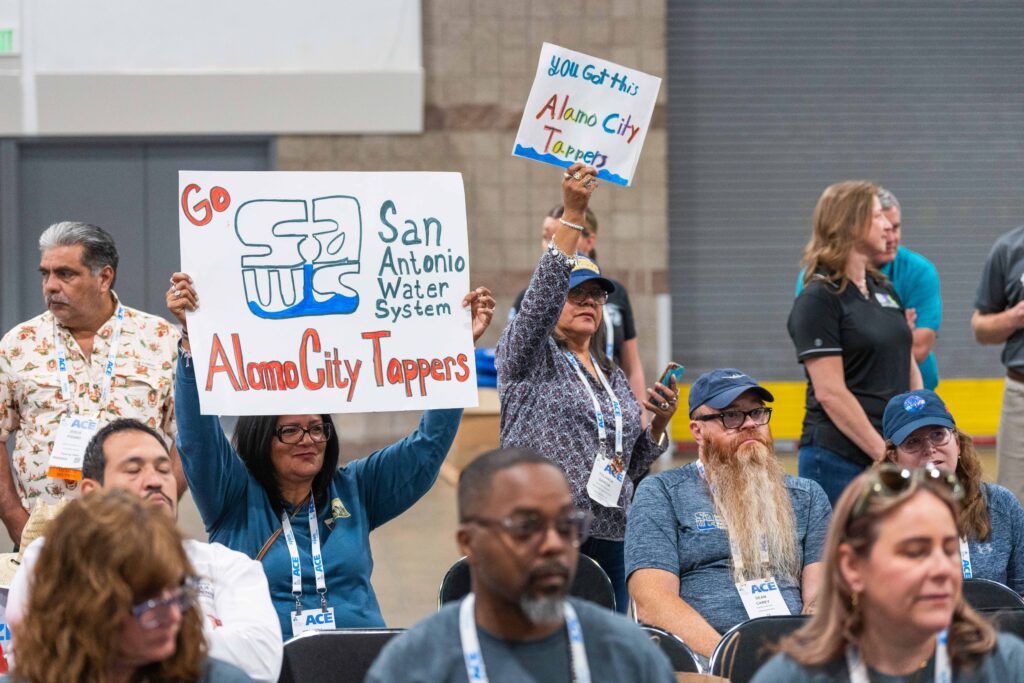
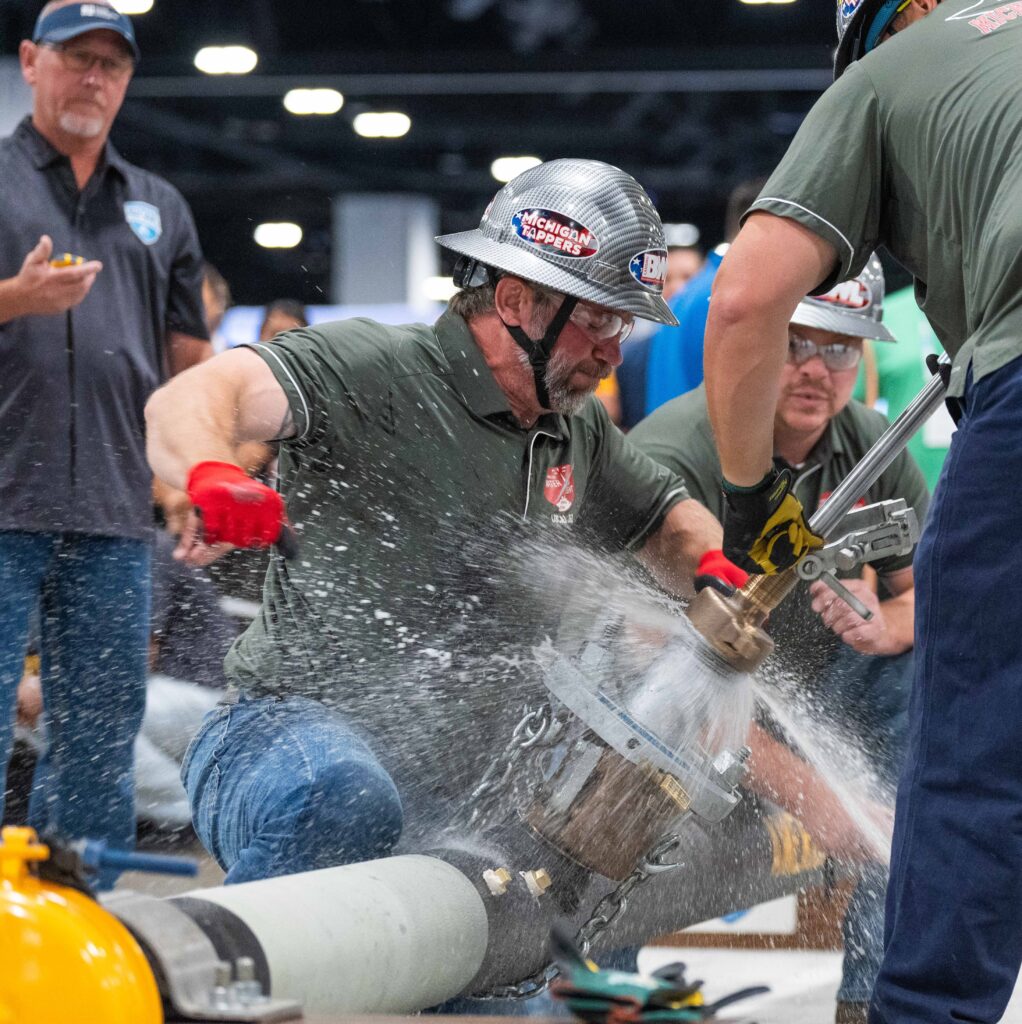
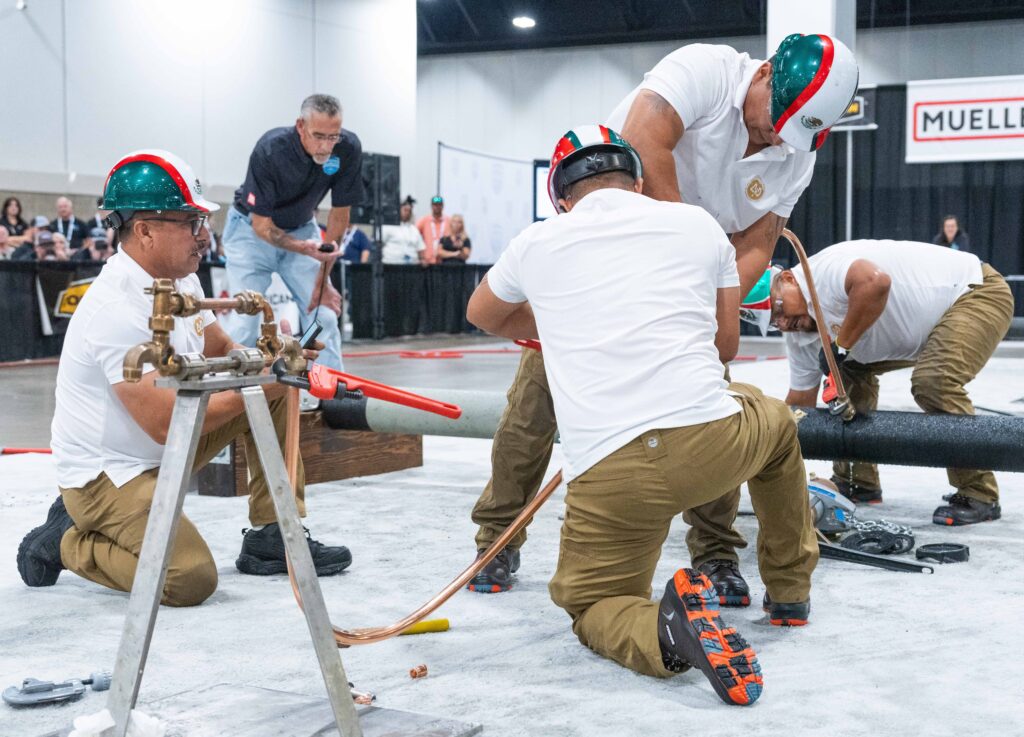
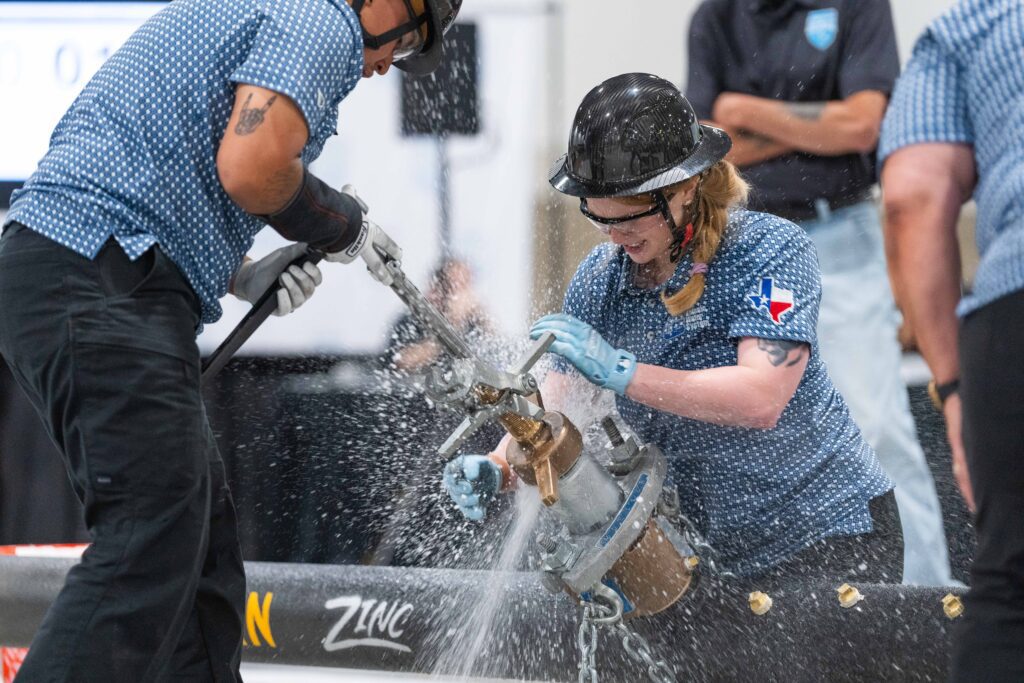
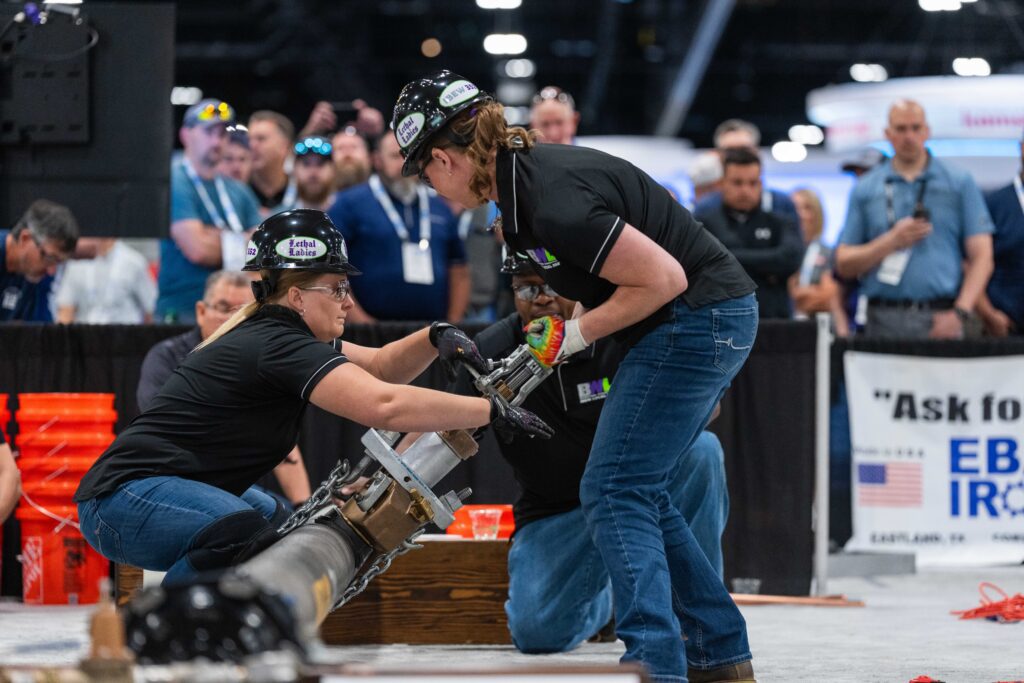
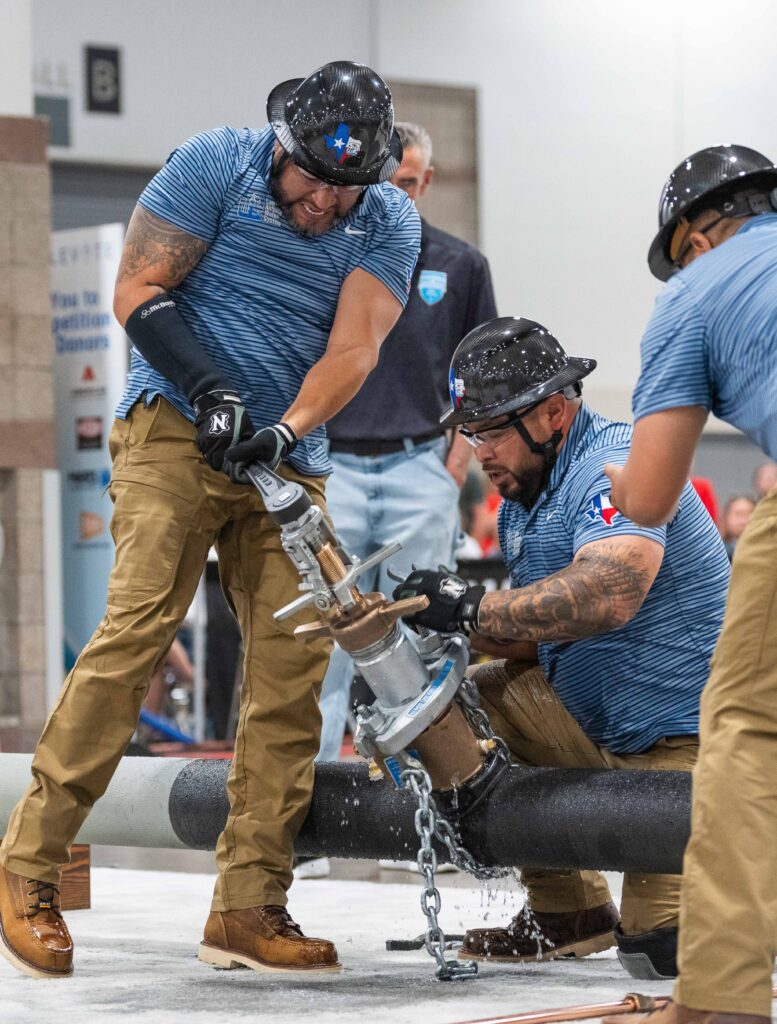
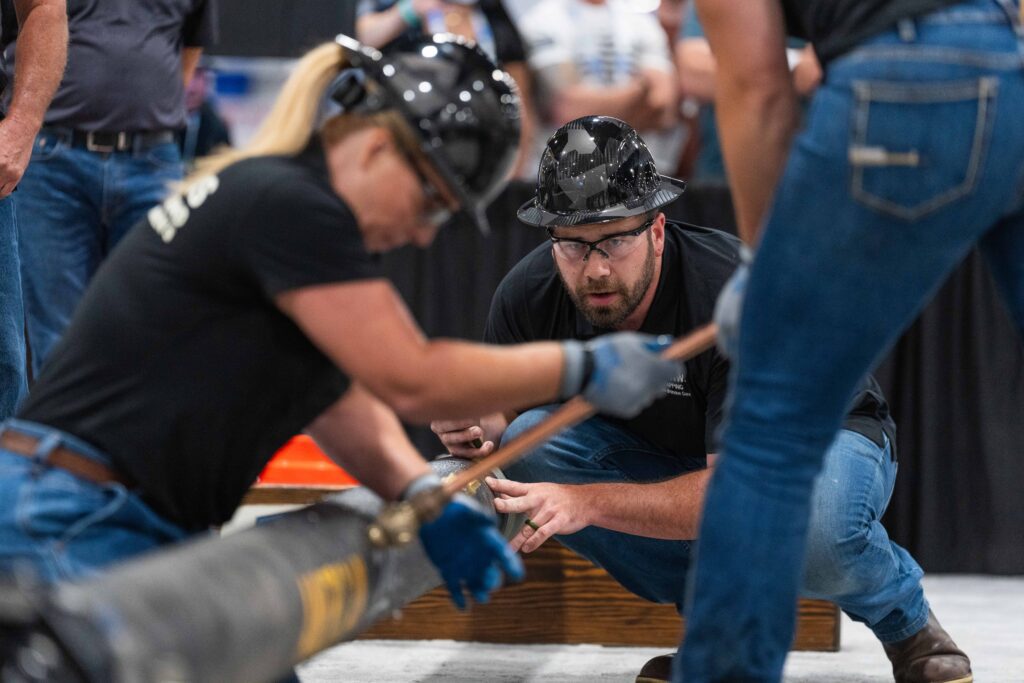
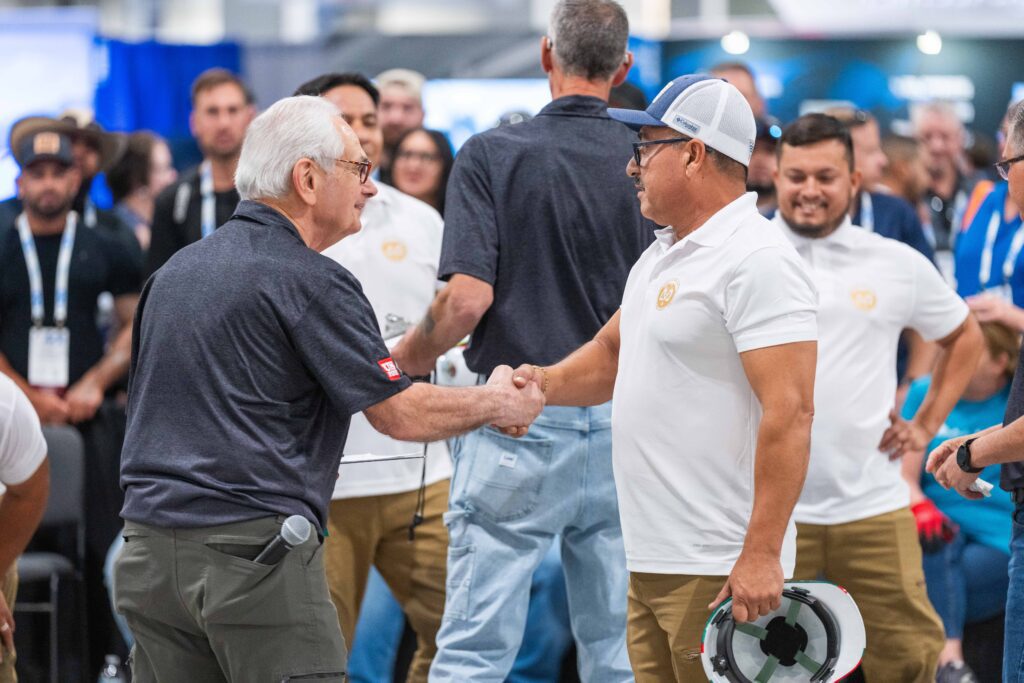
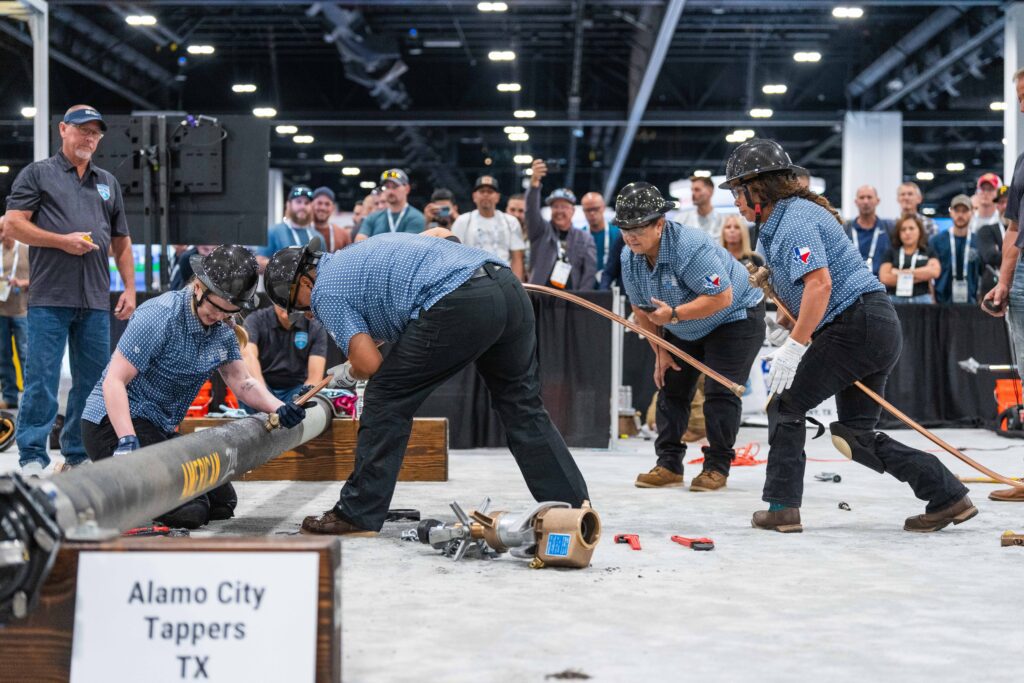
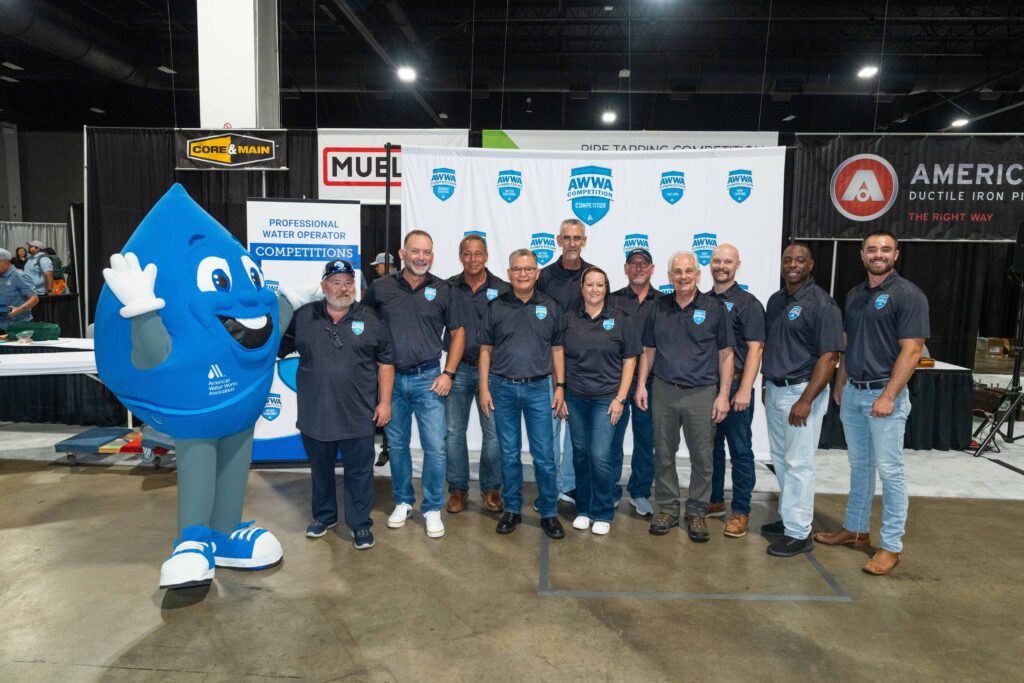
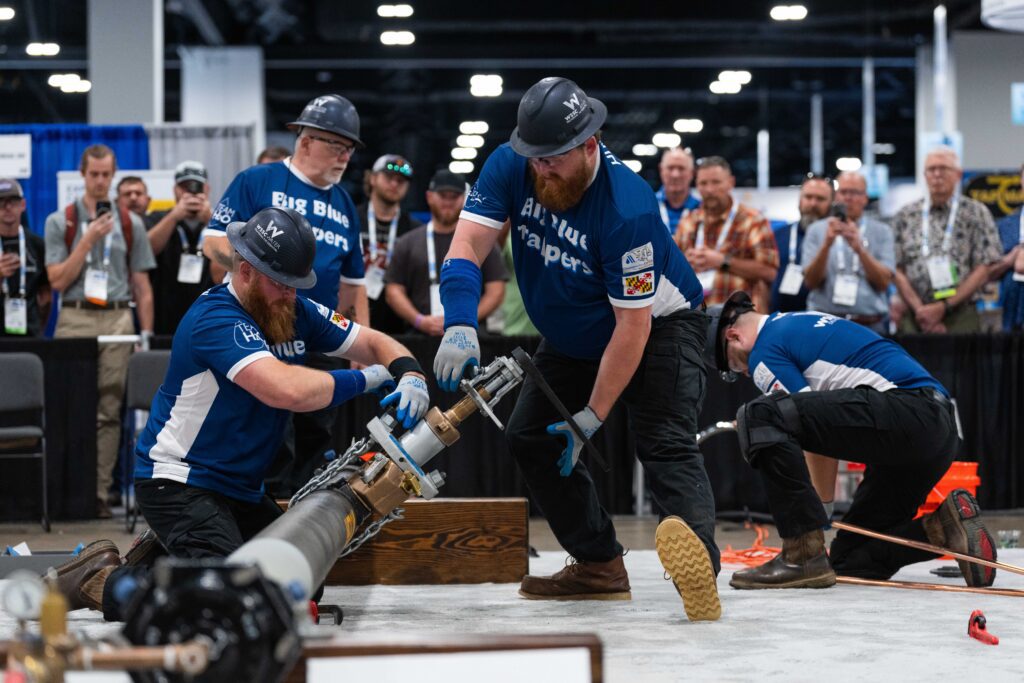
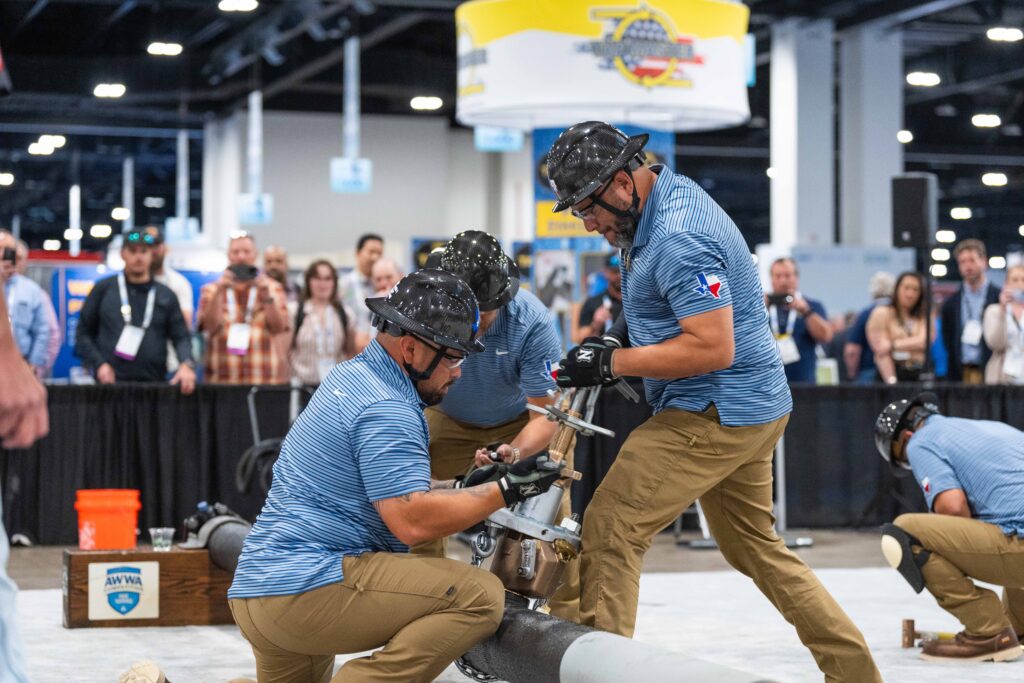
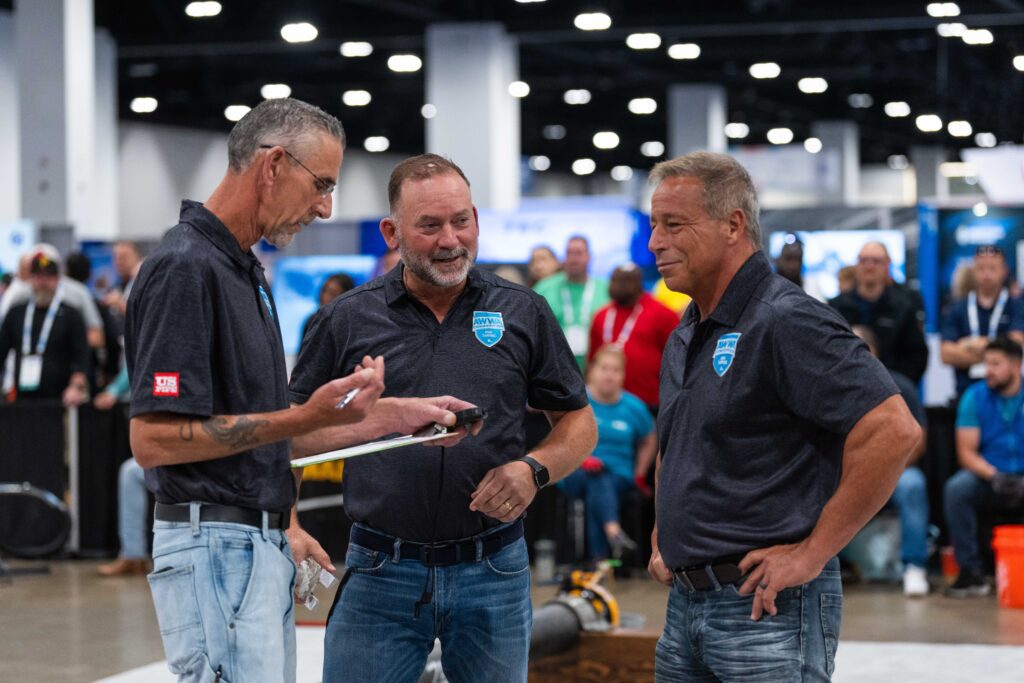
What is the AWWA National Pipe Tapping Competition?
The AWWA National Tapping Competition is a competition of skill in which water operators from across North America work against the clock to open a cement-lined, ductile iron pipe and install a tap.
The competition begins at the local AWWA Section level and the winners are then eligible to compete in the national Tapping Competition. There are two divisions, Men’s and Women’s.
Where is the Tapping Competition held?
The event is held during the AWWA’s Annual Conference & Exposition (ACE) in June every year.
May anyone enter the Competition?
All team members must be an individual, active, operations member of AWWA or a regular employee of a utility member or organization member. Each participating team represents an AWWA Section.
Help! My Section’s competition occurs after the registration deadline. Can my team still register for the Competition?
The contest coordinators realize that your Section normally sends a team. But do not wait until you have determined whether or not you are able to travel and have completed your hotel and airline reservations. Because of signage, supplies and other information, make contest registration your top priority. It is free and only takes a minute or two. To register contact competitions@awwa.org to confirm your eligibility and obtain access to the registration link.
How may I become a member of AWWA?
Visit our Membership page for more details:
My team won our Section’s Tapping Competition. How do we enroll in the ACE competition?
Contact competitions@awwa.org to confirm your eligibility and obtain access to the registration link. You do not need to register for ACE to participate in the Tapping Competition. However, if your team members would like to attend professional sessions or other activities associated with the conference, registration is necessary.
Is there a cut-off date to enter the Tapping Competition?
Yes. Please register as soon as possible. Signage is prepared the first week in May and the preliminaries schedule is created.
Our Section contest is later than the cut-off date. Can we still enter our team?
Please notify the AWWA Staff Coordinator of your delayed registration needs as soon as possible.
What are the prizes?
The winning men’s and women’s teams each receive trophies and the four team members expenses are paid to return to defend their titles at the next AWWA Annual Conference & Exposition.
Can a team member’s spouse, family, or guest obtain a complimentary badge to enter the Exhibit Hall for my competition?
Each competitor is allotted one complimentary badge. Children 12 and under receive free admission when accompanied by an adult.
What’s the national record for the fastest tapping team?
The national record is 1:01.95 set by the San Antonio, Texas team in 1994.
Our team is made up of two men and two women. Is there a “Co-Ed Division”?
When the Women’s Division was first set up, it was decided that all co-ed teams would compete with the men’s teams, so that is where your team must register.
May my team bring a tapping machine to the Pipe Tapping Contest?
No. In all fairness, the teams must use the equipment provided on site.
Our team won the national Tapping Competition. How are our expenses reimbursed to return for next year’s competition?
You must complete an official AWWA Expense Form and submit your receipts. To receive a form by email, contact the AWWA Staff Coordinator. Further information on covered expenses will be provided with the Reimbursement Policy and Form.
Is your company interested in providing InKind materials for a competition?
Please complete the attached InKind Material Sponsor Expression of Interest Form. Completed forms can be sent to the Competition Coordinator.
Hall of Fame
1st Place: Alamo Drillerz, Texas Section, 1:10:87
2nd Place: BWWB Blue Team, Alabama-Mississippi Section, 1:16:38
3rd Place: SADM Apodaca, Mexico Section, 1:17:31
4th Place: Michigan Tappers, Michigan Section, 1:22:82
5th Place: Big Blue Tappers, Washington Suburban Sanitary Commission, Chesapeake Section, 1:32:21
1st Place: Grit City Grind, Tacoma Water, Pacific Northwest Section, 2:29:47 (Returning Champions)
2nd Place: Alamo City Tappers, San Antonio Water Systems, Texas Section, 2:57:75
3rd Place: Lansing Lethal Ladies, Michigan Section, 3:08:31
1st Place: Servicios de Agua y Drenaje de Monterrey Apodaca, Mexico Section, 1:21.65
2nd Place: Birmingham Water Works Board, Alabama/Mississippi Section, 1:27.68
3rd Place: Big Blue Tappers, Washington Suburban Sanitary Commission, Chesapeake Section, 1:30.03
4th Place: Denver Water, Rocky Mountain Section, 1:42.79
5th Place: Beaufort Jasper Water and Sewer Authority, South Carolina Section, 1:49.63
1st Place: Grit City Grind, Tacoma Water, Pacific Northwest Section, 2:24.72
2nd Place: Big D Lady Tappers, Dallas Water Utilities, Texas Section, 2:25.97
3rd Place: Alamo City Tappers, San Antonio Water Systems, Texas Section, 2:28.22
1st Place : SADM Apodaca, Mexico 1:15:19
2nd Place: Alamo Drillerz, Texas 1:21:50
3rd Place: Denver Water Men’s Tapping, Rocky Mountain 1:29:34
1st Place: Big “D” Lady Tappers, Texas 1:59:15
2nd Place: Grit City Grind, Pacific Northwest 2:26:41
3rd Place: Lansing Lethal Ladies, Michigan 2:53:13
1st Place: SADM Apodaca, Mexico
2nd Place: Bama Boys, Alabama/Mississippi
3rd Place: Alamo Drillers, Texas
1st Place: Big “D” Lady Tappers, Texas
2nd Place: Lady Bandits, Texas
3rd Place: Lansing Lethal Ladies, Michigan
1st Place: Bama Boyz, Alabama-Mississippi, 1:08.56
2nd Place: SAD Apodaca, Mexico 1:12.06
3rd Place: SADM Nicolas, Mexico 1:16.85
1st Place: Big “D” Lady Tappers, Texas, 1:58.82
2nd Place: Lansing Lethal Ladies, Michigan 2:12.25
3rd Place: Alamo City Tappers, Texas 2:13.72
1st Place: Birmingham (Ala.) Water Works, 1:16:34
2nd Place: SADM Apodaca, 1:18.0
3rd Place: Spotsylvania County (Pa.) Utilities, 1:19.85
4th Place: SADM Guadalupe, 1:20.65
1st Place: Big D Lady Tappers, Dallas Water Utilities, 2:26.38
2nd Place: Lansing (Mich) Board of Water & Light, 2:30.28
3rd Place: Pretty Tough Tappers, City of Raleigh, N.C. Public Utilities, 2:50.65
4th Place: Spotsylvania, 1:20.25
5th Place: Birmingham Water Works Board, 1:39.63
1st Place: SADM Apodaca, SADM Monterrey, Mexico, 1:16.91
2nd Place: SADM San Miguel, SADM Monterrey, Mexico, 1:21.22
3rd Place: Birmingham Water Works, 1:21.62
4th Place: Silver State Tappers, Las Vegas Valley Water District, 1:23.03
5th Place: Spotsylvania County Utilities, 1:37.03
1st Place: Lansing Lethal Ladies, Lansing Board of Water & Light, 2:23.25
2nd Place: Smooth Operators, City of Troy, Mich., 2:40.09
3rd Place: Ductile Iron Divas, Greater Cincinnati Water Works, 3:06.78
1st Place: SADM Monterrey, Apodaca, Monterrey, Mexico 1:07:47
2nd Place: Spotsylvania, Fredericksburg, Virginia 1:12:69
3rd Place: Birmingham Water Works Board, Birmingham, Alabama; 1:19:94
4th Place: Smoking Bits, City of Concord, North Carolina, 1:26:25
5th Place: Tacoma Water Pipe Tapping Team, City of Tacoma, Washington; 2:05:78
1st Place: Lansing Lethal Ladies, Lansing, Michigan; 2:42:65
2nd Place: Smooth Operators, City of Troy, Michigan; 2:44:72
3rd Place: Denver (Women) Water Tapping, Denver, Colorado; 2:51:12
1st Place: SADM Monterrey, Apodaca, Monterrey, Mexico 1:11:97
2nd Place: Spotsylvania, Fredericksburg, Virginia 1:12:85
3rd Place: SADM San Miguel, Monterrey, Mexico; 1:15:50
4th Place: Greenwood Tappers, Greenwood, South Carolina, 1:21:90
5th Place: Denver Water Men’s Tapping, Denver, Colorado; 1:33:56
1st Place: Lansing Lethal Ladies; Lansing, Michigan; 2:35:87
2nd Place: GCWW Ductile Iron Divas, Cincinnati, Ohio; 2:48:34
3rd Place: Denver (women) Water Tapping, Denver, Colorado; 3:06:95
1st Place: SADM San Miguel; Agua Y Drenoje; 1:09:53
2nd Place: Birmingham Water Works; Birmingham, Alabama; 1:20:78
3rd Place: SADM San Nicholas; Agua Drenaje Monterrey, Mexico; 1:27:29
4th Place: Ottawa “Main”-iac Tappers; City of Ottawa, Ontario, Canada; 1:27:78
5th Place: United Water Idaho; Boise, Idaho; 1:48:85
1st Place: Lansing Lethal Ladies; Lansing, Michigan; 2:28:06
2nd Place: SAWS Alamo City Tappers; San Antonio, Texas; 2:45:78
3rd Place: Greater Cincinnati Water Works – Ductile Iron Divas; Cincinnati, Ohio; 3:09:65
1st Place: Birmingham Water Works Board; Birmingham, Alabama; 1:12:09
2nd Place: Four Jokers; Las Vegas, Nevada; 1:12:47
3rd Place: SADM Monterrey Apodaca; Mexico; 1:19:34
4th Place: Spotsylvania County; Fredericksburg, Virginia; 1:20:19
5th Place: SAWS South Texas; San Antonio, Texas; 1:20:72
1st Place: SAWS Alamo City Tappers; San Antonio, Texas; 2:23:81
2nd Place: Lansing Lethal Ladies; Lansing, Michigan; 2:32:06
3rd Place: Greater Cincinnati; Cincinnati, Ohio; 3:20:002012 in Dallas, Texas
1st Place: Birmingham, Alabama Water; Birmingham, Alabama; 1:10:22
2nd Place: Spotsylvania County; Fredericksburg, Virginia; 1:15:69
3rd Place: SADM Monterrey; Mexico; 1:21:78
1st Place: SAWS Alamo City Tappers, San Antonio, Texas; 2:04:29
2nd Place: Honolulu Water Supply, Honolulu, Hawaii: 2:10:41
3rd Place: Michigan Ladies; Lansing, Michigan; 2:25:87
1st Place: Spotsylvania County, Fredericksburg, Virginia; 1:09:16
2nd Place: SADM Monterrey; Mexico; 1:10:93
3rd Place: Birmingham, Alabama Water; Birmingham, Alabama; 1:19:35
4th Place: SADM Apodaca; Mexico; 1:24:12
5th Place: Tacoma Tapping Team; Tacoma, Washington; 1:41:72
1st Place: Honolulu Board of Water Supply Wahines, Honolulu, Hawaii; 2:35:18
2nd Place: Cleveland Ladies of the Lake; Cleveland, Ohio; 2:41:57
3rd Place: Alamo Tappers, San Antonio, Texas; 2:52:17
1st Place: Birmingham Water Works Board; Birmingham, Alabama; 1:14:00 2nd Place: Spotsylvania County Utilities; Spotsylvania, Virginia; 1:17:31
3rd Place: SAWS Men; San Antonio, Texas; 1:21:75
4th Place: Tacoma Water Men’s; Tacoma, Washington; 1:28:19 5th Place: City of Ottawa; Ontario, Canada; 1:41:47
1st Place: Honolulu Board of Water Supply Wahines; Honolulu, Hawaii; 2:12:47
2nd Place: Alamo City Tappers; San Antonio, Texas; 2:19:72
3rd Place: Bexarmet Office Girls; San Antonio, Texas; 2:37:47
1st Place: Tacoma Water Men’s; Tacoma, Washington; 1:13:38
2nd Place: Columbus Water; Columbus, Ohio; 1:13:69
3rd Place: SAWS Men; San Antonio, Texas; 1:17:41
4th Place: Spotsylvania County Utilities; Spotsylvania, Virginia; 1:22:44
5th Place: Birmingham Water Works Board; Birmingham, Alabama; 1:2:81
1st Place: Alamo City Tappers; San Antonio, Texas; 2:00:88
2nd Place: Honolulu Board of Water Supply; Honolulu, Hawaii; 2:09:37
3rd Place: Sassy Taps; Portland, Oregon; 2:24:75
1st Place: Columbus Water; Columbus, Ohio; 1:22:90
2nd Place: Four Jokers; Las Vegas, Nevada; 1:23:31
3rd Place: Birmingham Water Works Board; Birmingham, Alabama; 1:23:44 4th Place: SAWS Men’s; San Antonio, Texas; 1:24:93
5th Place: Volunteer Tappers; Maryville, Tennessee; 1:32:38
1st Place: Sassy Taps; Portland, Oregon; 2:13:97
2nd Place: Nitro Bits; 2:47:06
3rd Place: SAWS Women’s; San Antonio, Texas; 2:54:50
1st Place: Columbus Water; Columbus, Ohio; 1:17.06
2nd Place: Birmingham Water & Sewer, Birmingham, Alabama; 1:23.66
3rd Place: Troy Tappers; Troy, Michigan; 1:25.88
4th Place: Rockwood PUD; Canby, Oregon; 1:29.81
5th Place: Portland Hole Hawgs; 1:36.25
1st Place: SAWS Ladies Team; San Antonio, Texas; 1:54.75
2nd Place: Nitro Bits; Happy Valley, Oregon; 2:12.87
3rd Place: Girls on Tap; Palmdale, California 2:49.04
1st Place: Birmingham Water & Sewer: Birmingham, Alabama: 1:13.15
2nd Place: Spotsylvania County, Virginia: 1:16.91
3rd Place: Four Jokers, Las Vegas, Nevada: 1:17.25
4th Place: Honolulu, Hawaii Men: 1:23.56
5th Place: Troy Tappers: Michigan: 1:34.03
1st Place: Nitro Bits: Sunrise Water Authority, Oregon: 2:01.03
2nd Place: Na Wahine Oka Wai: Honolulu, Hawaii: 2:05.93
3rd Place: SAWS Women: San Antonio, Texas: 3:52.34
4th Place: Pipe Dreams: Ft. Thomas, Kentucky: 4:25.43
1st Place: Birmingham Water & Sewer; Birmingham, Alabama; 1:20.15
2nd Place: Northwest Oregon; Portland, Oregon; 1:28.15
3rd Place: City of Ottawa Water Division; Ottawa, Ontario, Canada; 1:35.28
4th Place: San Antonio Water System; San Antonio, Texas; 1:39.06
5th Place: Troy Tapping Team; Troy, Michigan; 1:39.31
1st Place: Na Wahine Oka Wai; Honolulu, Hawaii; 1:50.41
2nd Place: Three Queens and a Joker; Las Vegas, Nevada; 2:23.10
3rd Place: Louisville Water Tappers; Louisville, Kentucky; 2:24.63
4th Place: Nitro Bits; Sunrise Water Authority, Oregon; 2:28.72
5th Place: Tapi-Okies; Oklahoma City, Oklahoma; 02:37.06
1st Place: Birmingham Water & Sewer; Birmingham, Alabama; 1:15.96
2nd Place: San Antonio Water System; San Antonio, Texas; 1:18.91
3rd Place: City of Ottawa Water Division; Ottawa, Ontario, Canada; 1:30.09
4th Place: Northwest Oregon – Men; 1:32.78
5th Place: Elm City Tappers – Men; 1:35.88
1st Place: Louisville Water Co.; Louisville, Kentucky; 1:53.00
2nd Place: Na Wahine Oka Wai; Hawaii; 1:55.37
3rd Place: No Pressure; Las Vegas, Nevada; 2:26.34
1st Place: Northwest Oregon; Portland, Oregon; 1:21.15
2nd Place: Elm City Tappers; New Haven, Connecticut; 1:22:46
3rd Place: Birmingham Water & Sewer; Birmingham, Alabama; 1:26.69
4th Place: Honolulu Board of Water Supply; Honolulu, Hawaii; 1:30.44
5th Place: City of Ottawa Water Division; Ottawa, Ontario, Canada; 1:42.91
1st Place: Pipe Tapping Team #1; Birmingham, Alabama; 1:18.46
2nd Place: Lansing Board of Water & Light; Lansing, Michigan; 1:24.23
3rd Place: Elm City Tappers; New Haven, Connecticut; 1:29.77
4th Place: City of Ottawa Water Division; Ottawa, Ontario, Canada; 1:42.79
5th Place: Fairfax County Water Authority; Merrifield, Virginia; 1:50.59
1st Place: Louisville Water Co.; Louisville, Kentucky; 2:08.88
2nd Place: Honolulu Board of Water Supply; Honolulu, Hawaii; 2:16.65
3rd Place: Lansing Board of Water & Light; Lansing, Michigan; 2:30.34
1st Place: Pipe Tapping Team #1; Birmingham, Alabama; 1:12.00
2nd Place: Lansing Board of Water & Light; Lansing, Michigan; 1:32.00 (?)
3rd Place: Powell Valley Water District; Washington; 1:26.06
4th Place: Fairfax County Water Authority Tap Team; Virginia; 1:33.38
5th Place: Columbus Tapping Team; Columbus, Ohio; 1:37.60
1st Place: Mililani Leak Detection; Honolulu, Hawaii; 2:00.47
2nd Place: Louisville, Kentucky; 2:10.90
3rd Place: Lansing Board of Water & Light; Lansing, Michigan; 2:27.59
1st Place: Birmingham Water Works; Birmingham, Alabama; 1:06.77
2nd Place: Honolulu Board of Water Supply; Honolulu, Hawaii; 1:03.00 (?)
3rd Place: Elm City Tappers, Connecticut; 1:15.82
1st Place: Louisville Water Co.; Louisville, Kentucky; 2:05.95
1st Place: Honolulu Board of Water Supply; Honolulu, Hawaii; 1:07.73
2nd Place: San Antonio Water System, San Antonio Texas; 1:08.58
1st Place: Honolulu Board of Water Supply; Honolulu, Hawaii; 1:15.53
2nd Place: Birmingham Water Works; Birmingham, Alabama; 1:16.83
3rd Place: Reg. Munic. of Ottawa; Carleton, Ottawa, Canada; 1:21.27
4th Place: San Antonio, TX 1997 Champions (Practice); 1:32.83
5th Place: Corpus Christi Water Div.; Corpus Christi, Texas; 1:30.63
1st Place: Water & Wastewater Utilities, Oklahoma City, Oklahoma; 2:42.20
1st Place: San Antonio, Texas; 1:04.78
2nd Place: Birmingham Water Works; Birmingham, Alabama, 1:07.51
3rd Place: Mount Pleasant, North Carolina; 1:16.71
4th Place: Honolulu, Hawaii; 1:25.94
5th Place: Miami Dade, Miami, Florida; 1:44.09
1st Place: Birmingham Water Works Board; Birmingham, Alabama; 1:14.12
2nd Place: San Antonio Water System – #1, Texas; 1:14.35;
3rd Place: San Antonio Water System; 95 Champs, Texas; 1:17.24
4th Place: Los Angeles Dept. of Water & Power; Los Angeles, California 1:21.46
5th Place: Vancouver Water Department; Vancouver, Washington; 1:40.64
1st Place: San Antonio Water Board; San Antonio, Texas; 1:21.69
2nd Place: Birmingham Water and Sewer District; Birmingham, Alabama; 1:24.21
3rd Place: Los Angeles Department of Water and Power; Los Angeles, California 1:26.95
4th Place: Honolulu Board of Water Supply, Honolulu, Hawaii 1:37.38
5th Place: Las Vegas Valley Water District, Las Vegas, Nevada 1:40.61
1st Place: Los Angeles Department of Water and Power; Los Angeles, California; 1:07.21
2nd Place: Honolulu Board of Water Supply; Honolulu, Hawaii; 1:07.81
3rd Place: East Bay Municipal Utility District; Oakland, California; 1:15.08
4th Place: Tualatin Valley Water District; Beaverton, Oregon; 1:17.76
5th Place: Vancouver Water Department; Vancouver, Washington; 1:25.08
1st Place: Los Angeles Department of Water and Power; Los Angeles, California; 1:07.21
2nd Place: Honolulu Board of Water Supply; Honolulu, Hawaii; 1:07.81
3rd Place: East Bay Municipal Utility District; Oakland, California; 1:15.08
4th Place: Tualatin Valley Water District; Beaverton, Oregon; 1:17.76
5th Place: Vancouver Water Department; Vancouver, Washington; 1:25.08
1st Place: Los Angeles Department of Water and Power; Los Angeles, California; 1:11.50
2nd Place: Lansing Board of Water & Light; Lansing, Michigan; 1:18.67
3rd Place: Dallas Water Utilities; Dallas, Texas; 1:27.85
4th Place: Birmingham Water Works & Sewer Board; Birmingham, Alabama; 1:29.84
5th Place: Spartanburg Water District; Spartanburg, South Carolina; 1:38.25
1st Place: Los Angeles Department of Water and Power; Los Angeles, California; 1:11.40
2nd Place: East Bay Municipal Utility District; Oakland, California; 1:17.69
3rd Place: Bangor Water District; Bangor, Maine; 1:28.03
4th Place: Soos Creek Water & Sewer District; Renton, Washington; 1:29.01
5th Place: Birmingham Water Works & Sewer Board; Birmingham, Alabama; 2:12.75
1st Place: Los Angeles Department of Water and Power; Los Angeles, California; 1:17.67
2nd Place: East Bay Municipal Utility District; Oakland, California; 1:29.58
3rd Place: Spartanburg Water System; South Carolina; 1:31.69
4th Place: Dallas Water Utilities; Dallas, Texas; 1:37.76
5th Place: Salt Lake City Public Utilities; Salt Lake City, Utah; 1:48.85
1st Place: East Bay Municipal Utility District; Oakland, California; 1:20.22
2nd Place: Los Angeles Department of Water & Power; Los Angeles, California; 1:27.47
3rd Place: East Bay Municipal Utility District #2 Team; Oakland, California; 1:39.53
4th Place: SW Pennsylvania Water Authority; Jefferson, Pennsylvania; 1:55.02
5th Place: Hackensack Water Company; Hackensack, New Jersey; 2:03.22
1st Place: SW Pennsylvania Water Authority; Jefferson, Pennsylvania; 1:51.55
2nd Place: Vancouver Water Department; Vancouver, Washington; 2:09.76
3rd Place: Denver Water Department; Denver, Colorado; 2:20.43
4th Place: Wichita Water Department; Wichita, Kansas; 2:20.63
5th Place: Lima Water Department; Lima, Ohio; 2:28.23
1st Place: Lima Water Department; Lima, Ohio; 2:44
2nd Place: Denver Water Department; Denver, Colorado; 2:47
2nd Place: Southwest Pennsylvania Water Authority; Jefferson, Pennsylvania; 2:47
Load More
AWWA specifically does not endorse products manufactured by sponsors and takes no position concerning the adequacy of such products or their compliance with any AWWA Standard.
